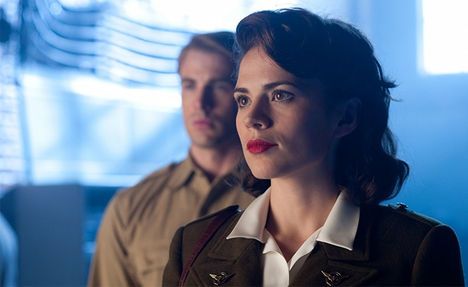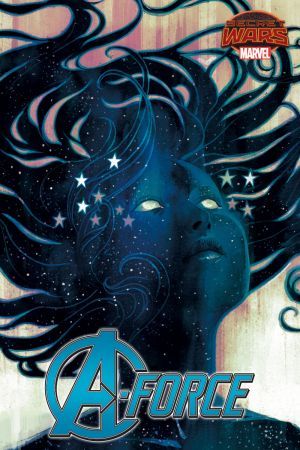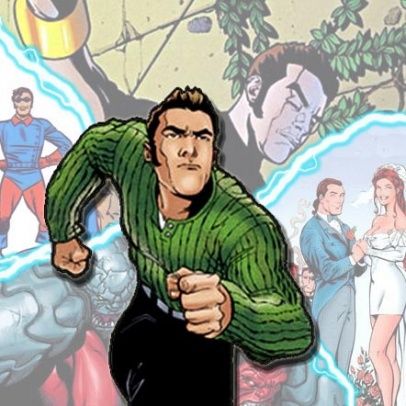OK, first let's get this out of the way: A-Force? Really?
That's a terrible name! That's just going to lead to schlocky journalists serving up headlines like "These Marvel ladies are A-FORCE to be reckoned with!" It seems lazy and uninspired, although you could say that they were inspired by X-Force, but that's a tacky name I've had decades to get used to. Also, it was the '90s, everyone had tacky names. I suppose I could count myself lucky they aren't "Force Works," but when the Defenders are right there and Valkyrie was already tasked to create a team of heroines ... ugh. A-Force.
More important than the name or the roster is the writing team of G. Willow Wilson and Marguerite Bennett, who are bringing incredible work to the pages of Ms. Marvel and Angela: Asgard's Assassin, respectively. Both authors have taken the idea of diversity in stride, making representation in their books relatable and honest. Ms. Marvel isn't just a Muslim superheroine; she's a teenager with the same hopes and likes as a variety of readers, young and old. There's a new element added into Angela: Asgard's Assassin that I won't spoil, but it's an accomplishment to be sure, done with heart and little fanfare.
Marvel is touting A-Force as its first all-female team of Avengers with all the headlines that deserves, but I have to say that not every big paradigm shift gets that USA Today article or intended announcement on The View. Marvel hasn't handled diversity perfectly, as if any company can, nor is it ever "good enough" in a way that declares everyone equal and all sides represented, let's all go home. If anything, the subtle changes and story beats are probably the best way to broaden readers' minds and open up the field for more than just rich white-guy problems. If you don't shine a spotlight on the change, it can work its magic on the reader with more context within the story they were reading already, letting it become the norm until you realize that ... wait ... for a while there the roster of the X-Men were mostly women and all of them were fully realized characters with dramatic storytelling potential.
Complicated casts need a point-of-view character, someone for the audience to relate to in a world of complex wonder. Not only do readers get someone on their side to voice questions and concerns, but it can help to ground an outrageous tale in something more personal. For years, the Marvel Universe had its own POV character in Rick Jones.
He began in The Incredible Hulk as the catalyst for Bruce Banner's tragic change and stuck around as both a sidekick and interpreter. He could make the Hulk scary or sympathetic by his reaction and ability to help the Jade Giant through his adventures. Jones even helped the Hulk into the Avengers and remained with the group when the Hulk had enough and left. That connected him to Captain America, and was even a new Bucky until they both realized it was time to move on. Rick then became connected to space through adventures in Nega-Band bonding with two Captain Marvels, aiding the much-loved Rom, the Spaceknight, being the key factor in the Kree-Skrull War, dying with the rest of the Marvel Universe in Infinity Gauntlet. His destiny and impact places him alongside the greatest of Earth's heroes.
However, he's also still been himself, writing a book within the Marvel Universe called Sidekicks, getting his own talk show, even getting married. Rick Jones is a mortal man with connections to the Marvel Universe, letting us come along with him for the adventure.
Modern Peggy Carter, as we've come to know her in the Marvel Cinematic Universe, shares a similar function, if a wildly different background.
She was introduced to us through Captain America: The First Avenger, the start of the timeline for the MCU. She was there at the inception of Marvel's modern superheroes, not only for Captain America himself but for the organization that calls the Avengers together. Her extensive spy skills and connections put her in touch with the MCU's biggest secrets that we discover along with her. Not only is she closely tied to Howard Stark, thus giving her a link to Iron Man, but recent episodes of Marvel's Agent Carter have gotten us into the infamous Red Room, exploring both the Black Widow and the Winter Soldier's deep roots.
Agent Carter, for all intents and purposes, can explore current canon more effectively than, say, Agents of S.H.I.E.L.D. can. The latter focuses more on bringing in new story and juggles a much larger cast of characters, while Agent Carter, by benefit of being set in the 1940s, can help us understand what we've already seen.
Peggy Carter is human and will remain so. She will cry at the loss of a friend, struggle with her responsibilities and fight personal injustice as much as she'll take on shadowy organizations. She can grow in understanding along with us as we learn more about the MCU and Carter herself. She has no super-powers, no abundance of cash and time, no genius intellect or status, Peggy Carter is just a woman of tremendous will and moral character, both of which last from the 1940s to the modern day. We see the Marvel Universe through her eyes and fierce determination, placing her alongside the greatest of Earth's heroes. Peggy Carter is a mortal woman with deep roots into the the Marvel Cinematic Universe at large, letting us come along with her for the adventure.



